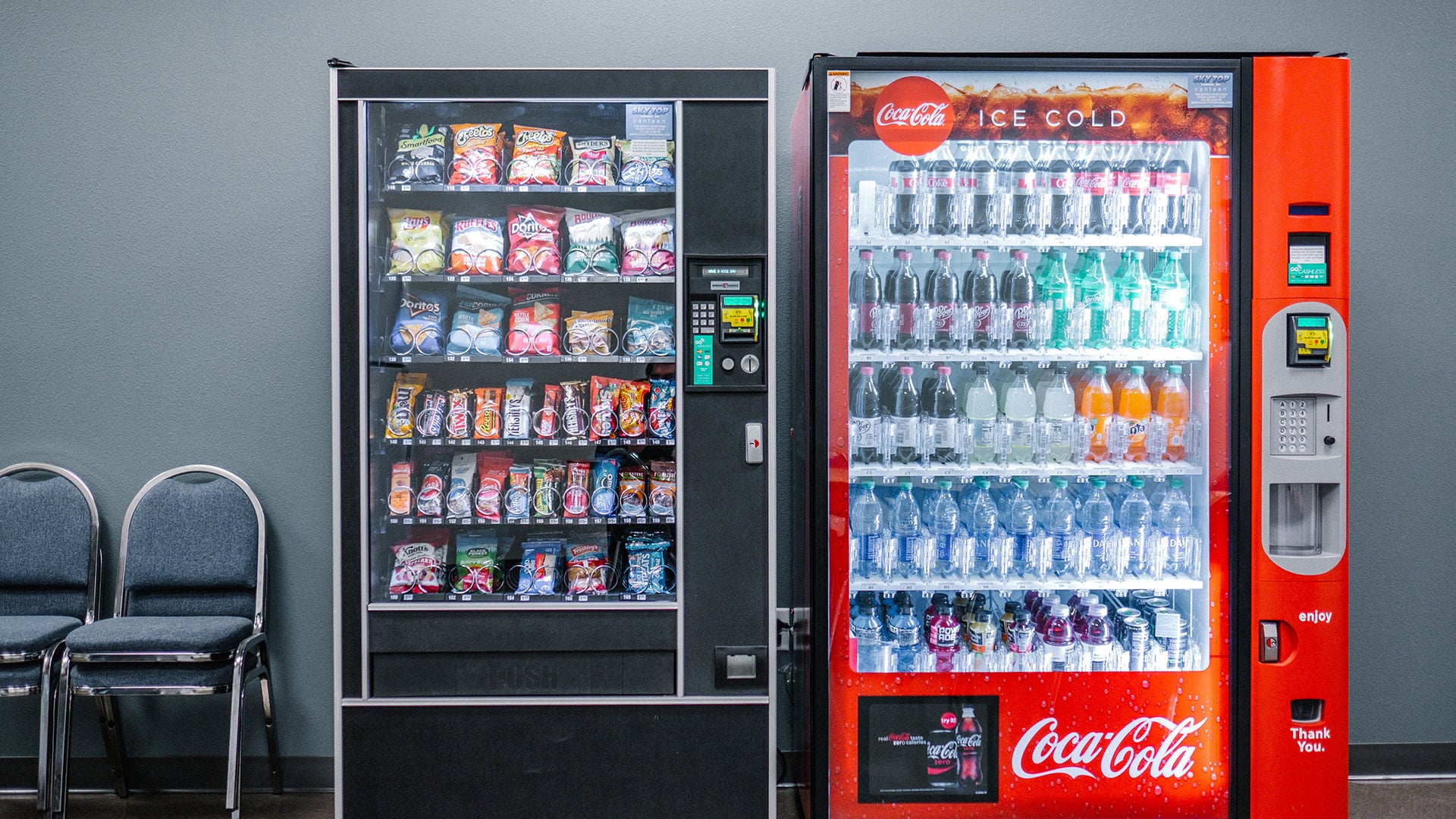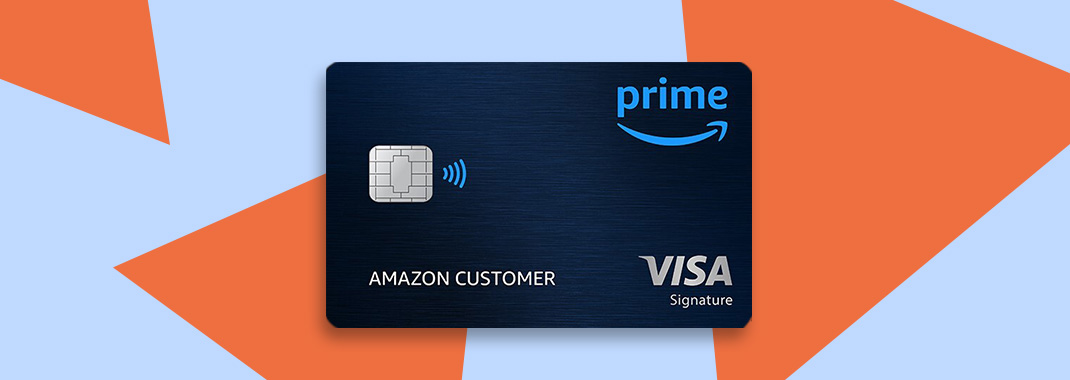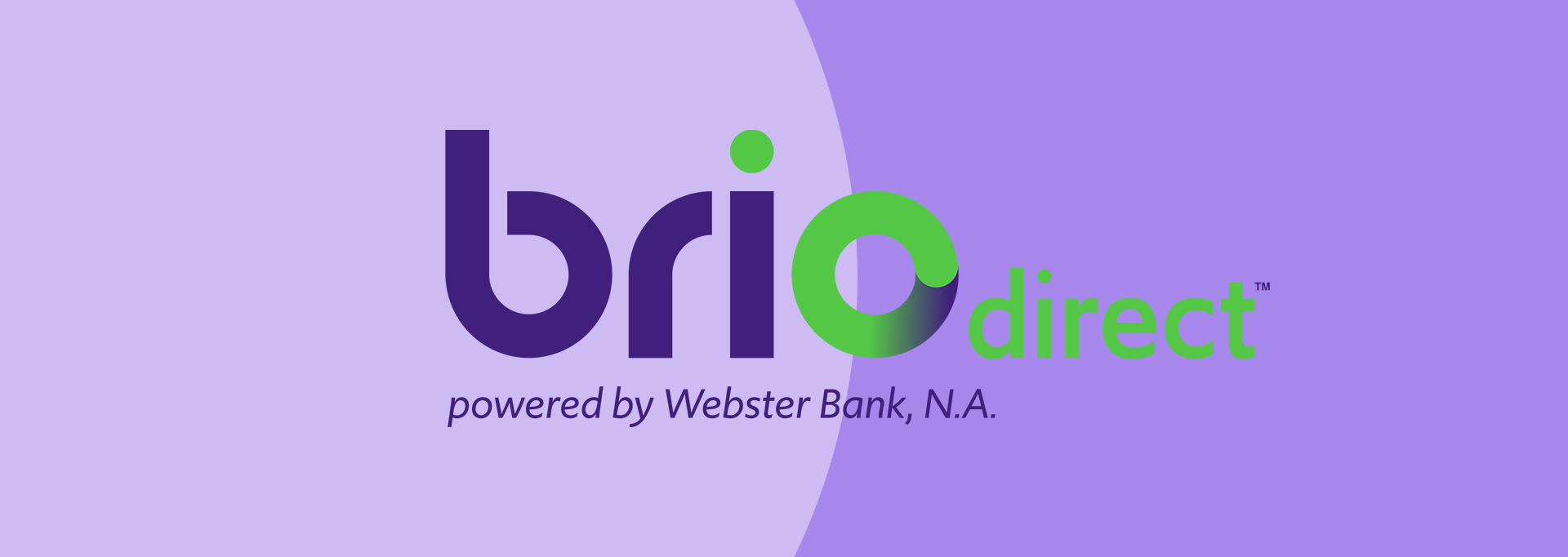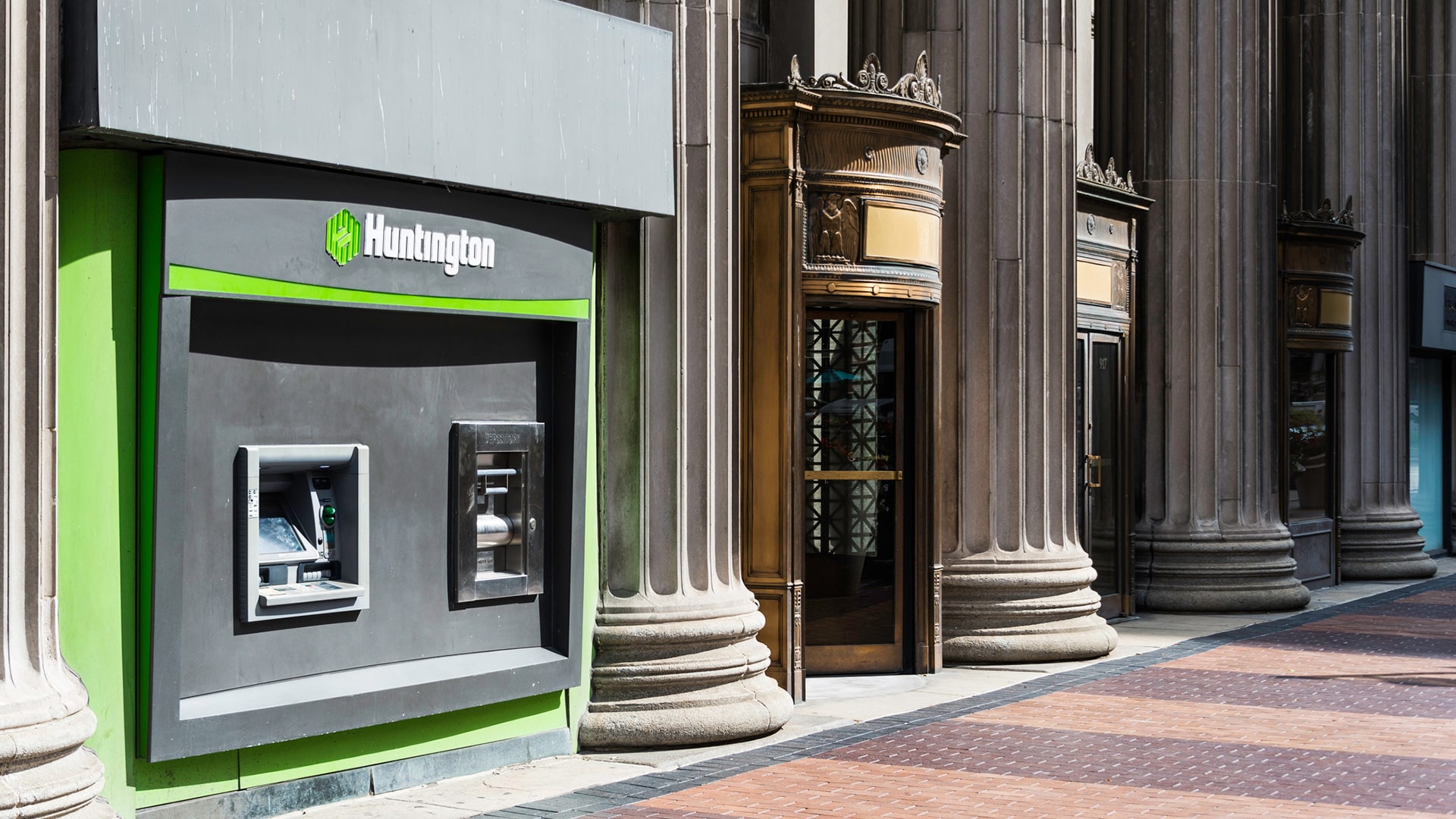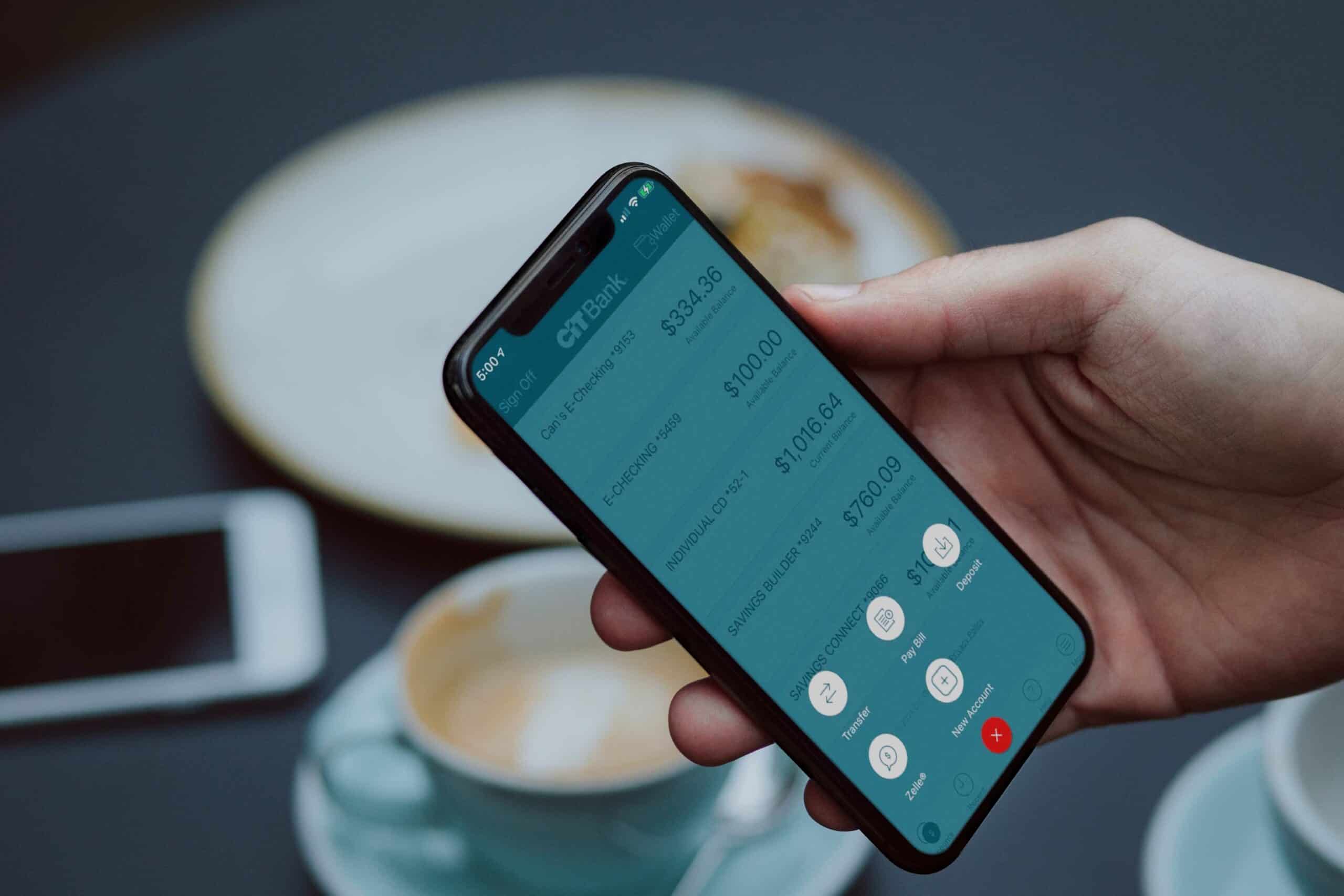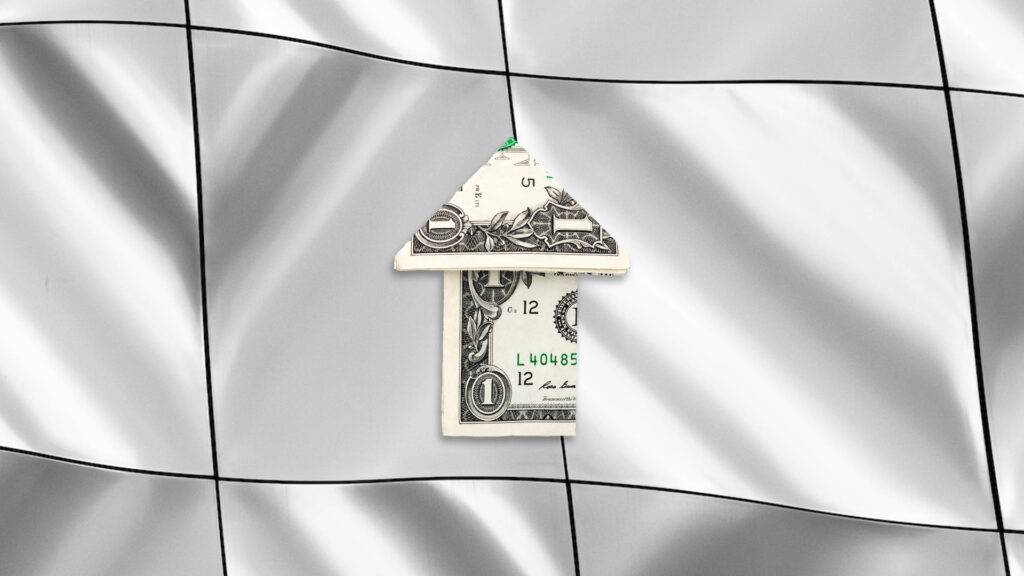Most products on this page are from partners who may compensate us. This may influence which products we write about and where and how they appear on the page. However, opinions expressed here are the author's alone, not those of any bank, credit card issuer, airline or hotel chain. This page may include information about American Express products currently unavailable on Slickdeals. American Express is not a partner of Slickdeals.
Americans spend billions at vending machines every year. In fact, the market size of the vending machine operators industry is around $10 billion according to research firm IBISWorld. What’s more, amusement equipment distributor Betson Enterprises reports that the average vending machine earns $75 per week. Well-stocked machines in high-traffic areas, however, can bring in more than $500 per month—or even more.
From schools and churches to hospitals and office buildings, vending machines are a common part of everyday life for communities around the country, and a lucrative one at that. Here’s what you need to know to get started running your own vending machine business.
Business Tips for Starting Your Vending Machine Company
Before you get started, you'll need to get set up as a business. A vending machine business can differ from other companies, but it's critical to treat it with the same respect and attention you would give when starting any business.
Some steps to consider taking when you start your new business:
- Choose a business entity: It's important to select the right entity based on your situation, such as a limited liability corporation, corporation or sole proprietorship. The choice can affect how you pay taxes and more. Consider talking to an attorney for guidance if you have questions about the best fit for you.
- Apply for an employer identification number (EIN): You need an EIN—also called a federal tax ID number—from the IRS to pay and file taxes for your new vending machine business.
- Get licensed: Depending on where you want to place your vending machines, you may need to apply for special licenses from your state and city.
- Separate business and personal finances: It's essential to avoid mixing business and personal finances. This means you need to open a separate business checking account and perhaps a business savings account. A business credit card could also help keep business expenses off your personal accounts and might help you build business credit as a bonus.
Quick Tip
You might be able to qualify for a small business bank bonus when you open a new business checking account and earn some extra cash to apply toward your startup costs.
5 Steps to Starting a Vending Machine Business
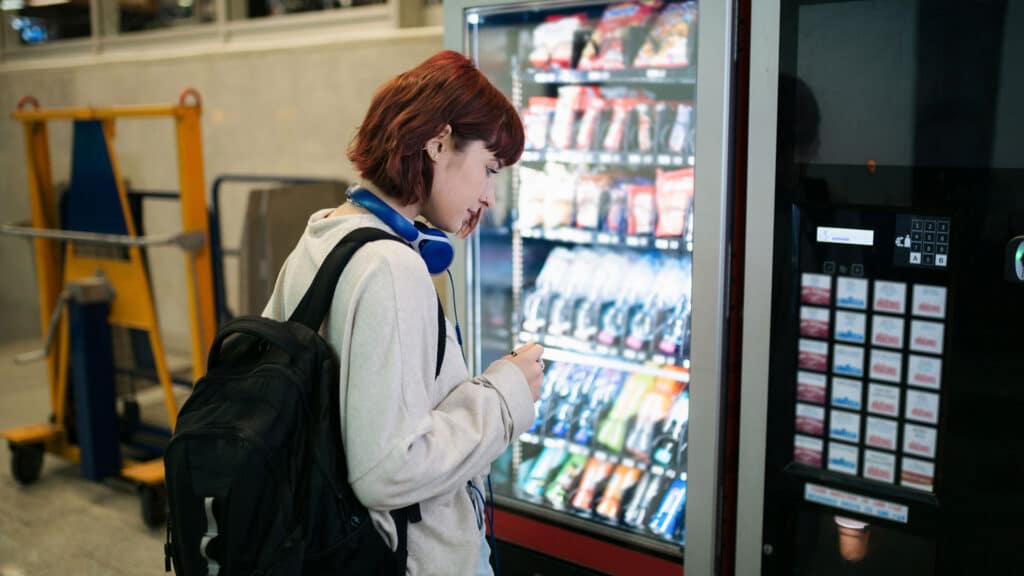
There’s high consumer demand for vending machines, but there’s also a lot of competition in the marketplace. So it's still essential to have a solid plan if you want to avoid problems and set yourself up for the best chance of success.
Here are five steps to starting a vending machine business:
- Figure out what you want to sell
- Calculate your costs
- Find great locations
- Negotiate with property owners
- Stock the right inventory
We'll walk you through five steps that could help you get your vending machine business off to a great start as well as some general business tips and the pros and cons of running a vending machine business.
1. Figure Out What You Want to Sell
This could vary depending on the locations you pick, but it’s good to have an idea in mind because the possibilities are endless. You could stock snacks at ballparks, coffee and candy in office break rooms or hygiene products in public restrooms.
Vending machines offer a huge range of products these days, including:
- Snacks and candy
- Soda and bottled water
- Coffee and other hot drinks
- Refrigerated or warm foods
- T-shirts and other apparel
- Toiletries and hygiene products
- Personal protective equipment
- Baked goods
- Original art
- Toys
- Books
- Jewelry and trinkets
- Playing cards and games
Do some market research for the areas you want your machines in to see if there are any gaps in inventory or types of businesses that could benefit from certain products. If you have any experience with certain goods, think through if they would work in vending machines or at certain properties.
This could also impact the type and size of machines you need to buy. Some machines can be used to sell a variety of small products, but others are more customized for specialty items, like champagne or cakes that may need refrigeration or specially sized compartments.
2. Include and Plan for Expenses
As a small business owner, you never want to be surprised about the expenses associated with starting or running a business. So, it's smart to do your homework in advance to be prepared. Knowing what costs to expect up front can help you understand how much capital you need to raise (or how much business financing you need to get) to get your new startup off the ground. This information is also critical when you create your business budget.
Here are some common expenses you may face when starting and running a vending machine business.
Machines
The machines themselves are likely the biggest expenditure you'll face. Costs can range widely depending on the type, size and brand, but many made-to-sell products are around $3,000. Bulk vending machines that sell a single product, by comparison, may be available for under $1,000.
It's also not unheard of to see costs climb much higher for a vending machine. Machines that accept credit card payments, for example, might cost more than those that don't. And you'll also have the added cost of payment processing if you want to set up a merchant account to accept credit card payments.
It's wise to shop around for the best deal. If you're buying multiple vending machines, you may be able to find a supplier or manufacturer willing to offer you a bulk discount.
Other creative ways to find vending machines:
- Purchase them used or refurbished
- Lease vending machines
- Acquire another entrepreneur's route with existing machines (and service contracts) in place
- Buy into a vending machine business franchise
Be sure to protect yourself from potential scams as you look to buy vending machines. If you're unsure whether a business opportunity is legitimate, you may want to consult with an attorney for added support—especially if an offer seems too good to be true.
Maintenance and Repairs
If you're fortunate, your vending machines will see a lot of use. Yet that also means the machines may be subject to breakdowns. And since your machines will be left in public locations, they might also be exposed to theft or even vandalism.
Factor repairs and regular maintenance into your business budget. In addition to building a repair fund to address potential damages, allocate funds for routine cleaning and maintenance—work you'll either do yourself or pay someone else to do.
Quick Tip
Add service stickers with contact information that’s easy to locate on each of your vending machines. Then, if a problem arises it will be easy for someone to report the issue. The longer a vending machine is down, the less money it can earn.
3. Get Strategic About Location
Finding the right locations is a critical component of your success, and the profit your business earns has a lot to do with where your vending machines are located.
Here are some potential vending machine locations to help inspire you:
- Office buildings
- Break rooms
- Malls or shopping centers
- Schools (public and private)
- Day care centers
- Manufacturing plants
- Auto repair shops
- Grocery stores
- Gyms
- Children's sports and activity centers (e.g., dance studios and martial arts facilities)
- Laundromats
- Motels
- Hospitals
- Veterinarian offices
- Car dealerships
- College dorms and student centers
4. Negotiate With Property Managers
Start by letting the owner or property manager of a location know what's in it for them. You may want to consider offering either a flat monthly rental fee or a portion of your monthly sales in exchange for permission to place your equipment on their property and sell products. It may also be helpful to explain how you plan to improve the space and bring value to the business owner's existing customers.
If you negotiate an arrangement that makes everyone happy, put everything in writing. In other words, you need a service contract between you and the owner of each business location where you will be placing your vending machines.
Afterward, make an effort to maintain a good relationship with the business owner at each site. It's also wise to continue growing your list of potential new locations for future vending machines so it will be easier to expand your business with future profits.
5. Stock the Right Inventory—and Adapt
The right products can make or break your vending machine's success. Coffee, for example, might not be the ideal choice for a vending machine in a grade school (unless it’s in the teacher's lounge). But it could also be a hit in the break room at a manufacturing plant.
Even with your initial product research, you may have to pivot and adapt to market and customer changes as you go. Finding the best products for each location involves trial and error. Keep records regarding which snacks and drinks perform the best at different locations. And take into account any seasonal fluctuations in your customer's buying habits too.
You can also search for bulk and wholesale discounts to keep your inventory costs as low as possible. The more profit you can earn per unit you sell, the better.
Benefits of Owning a Vending Machine Business
If you have some time, money and an entrepreneurial spirit, a vending machine business could be a profitable venture for you.
Here are some of the benefits of owning a vending machine business:
- You don’t need experience: Some business knowledge could certainly help, but you don’t technically need specific experience to get started and don’t have to pass an interview or impress a boss to start your business.
- Can have low startup costs: It depends on how many machines you want to start with (and the type of product you’ll stock), but generally speaking, you can get started with a few or even one machine and work on investing back into the business to grow over time. Some people start their vending machine businesses with as little as a few thousand dollars.
- You’ll be your own boss: Sure, you’ll need great communication and customer service skills, and you’ll need to negotiate with property managers, but at the end of the day, owning a vending machine makes you your own boss, which means you get more flexibility and autonomy.
- Can earn passive income: Starting any business requires a lot of upfront time and commitment, but once your vending machine business is up and running, you can be at least partially hands off. You’ll have to keep on top of inventory, maintenance and other tasks, but these might not be a full-time commitment. And if the business is successful enough, you could hire someone to handle that for you.
Drawbacks of Owning a Vending Machine Business
All business ventures have their drawbacks, and running a vending machine company is no different.
Here are some potential downsides of a vending machine business:
- It’s a competitive field: This is especially true when it comes to finding prime locations for your vending machines. You might notice your favorite spots already have machines, and you may not be in a position to be competitively priced right out of the gate. You may have to get creative about the best locations or inventory to stand out from the pack.
- Can be time-consuming: A vending machine business can generate passive income in some scenarios, but when you’re getting started, or if things really take off, you might be committing more time than planned as you juggle the ins and outs of running a business. If time is at a premium in your life, consider starting small.
- Consumer preferences can change: Like any industry, vending machines are at the whim of the consumer. If you’re stocking soda and candy at a shopping center, for example, and the customer base moves toward healthier options, you’ll have to pivot with them to stay profitable. Staying on top of trends and consumer preferences is key.
- Machines need maintenance: Even if you buy top-of-the-line machines, they will eventually need repairs. Plus, you’ll want to schedule regular maintenance to extend their operating life, typically every three months or so, though it depends on the machine. These things take time and money however you slice it—either you’ll need to put in the time or you’ll have to hire someone for the upkeep.
Is a Vending Machine Business Worth It?
Running a vending machine business can be a rewarding and profitable venture in the right hands. It could be worth it if you have an entrepreneurial personality or love the challenge of running a business. The potential payoffs include a semi-passive income stream and a flexible schedule that puts you in charge.
On the other hand, running a vending machine business may not be worth it for people who don’t have a lot of free time or can’t cover the startup costs. People who don’t have the flexibility to visit various properties or don’t feel comfortable with the sales and negotiation side of the business may be better off with a different side hustle.
